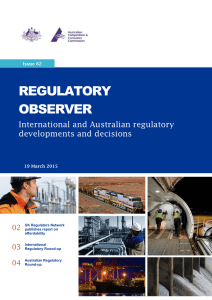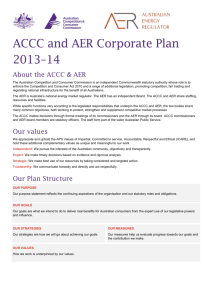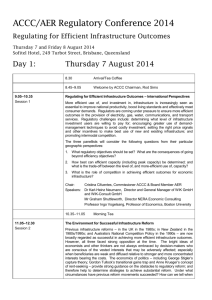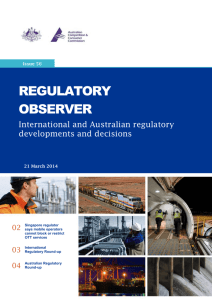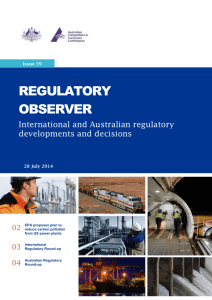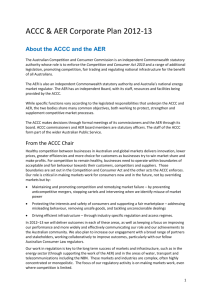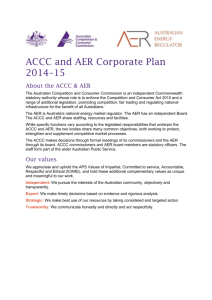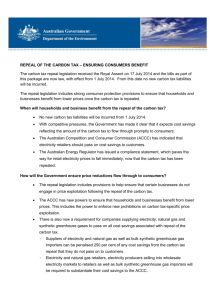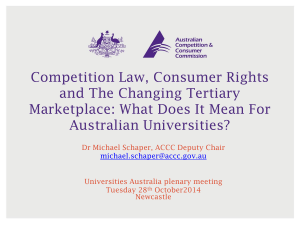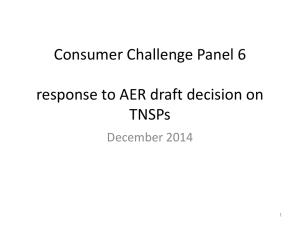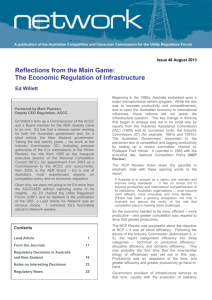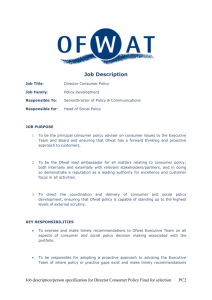International Regulatory Round-up
advertisement
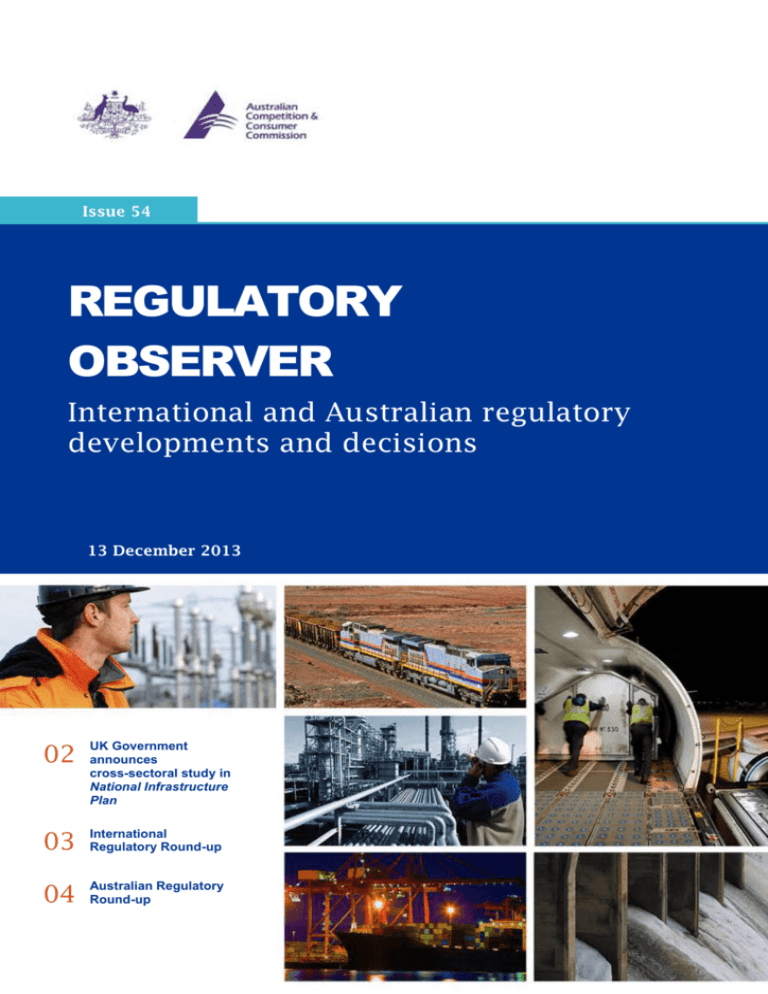
International and Australian regulatory developments and decisions Issue 54 REGULATORY OBSERVER International and Australian regulatory developments and decisions 13 December 2013 02 UK Government announces cross-sectoral study in National Infrastructure Plan 03 International Regulatory Round-up 04 Australian Regulatory Round-up 1 REGULATORY OBSERVER UK Government announces cross-sectoral study in National Infrastructure Plan On 5 December 2013, the UK Treasury and Infrastructure UK issued the updated National Infrastructure Plan 2013. The first of these plans was issued in 2010. The latest iteration sets out the challenges facing UK infrastructure and the government’s strategy for meeting the infrastructure needs of the economy. The plan includes a forward-looking infrastructure pipeline, including detail on the status of planned and potential infrastructure investments in the UK. The infrastructure pipeline is a bottom up assessment of potential infrastructure investment to 2020 and beyond, which includes large infrastructure projects with a capital value of £50 million and over. The pipeline also includes large capital programmes of investment of £50 million or over, which may consist of a number of smaller projects which are grouped together and are often rolling investments. The overall value of the pipeline has increased from over £309 billion to over £375 billion of investment since the previous update. Most of the value of the pipeline is in the energy and transport sectors, totalling over £340 billion of combined investment. As part of the plan, the Treasury and Department of Business, Innovation and Skills (BIS) have initiated a joint cross-sectoral study. The study, which will be conducted with expert input from UK regulators, will focus on the way regulators work together and with government on issues related to cross-sector infrastructure delivery. More specifically, the study will consider: how economic regulators can better address cross-sector issues and achieve efficiencies in their own decision-making processes; the role regulators should have in supporting economic growth, and how their duties contribute to this; and options to improve the impact of the regulatory environment on consumer outcomes. The study will make recommendations in the UK Spring 2014. In response to the study’s announcement, the Civil Aviation Authority (CAA), the Office of Communications (Ofcom), the Office of Gas and Electricity Markets (Ofgem), the Office of Rail Regulation (ORR) and the Office of Water Services (Ofwat) issued a joint statement. The regulators noted they have already taken steps to work more closely on issues of cross-sectoral significance and in learning lessons across industries. The regulators will undertake further work to assess the overall affordability of infrastructure on customer bills; lessons from each sector on empowering consumers to get the best deals and how, working together, they can help to improve the environment for efficient investment in UK infrastructure. A wider group of UK economic regulators is also developing a collaborative programme of work on cross-sectoral issues, which will be announced in the UK Spring. This group includes the CAA, the Ofcom, the Ofgem, the Financial Conduct Authority, Monitor, the ORR, the Utility Regulator for Northern Ireland, the Ofwat and the Water Industry Commission for Scotland. 2 REGULATORY OBSERVER International Regulatory Round-up COMMUNICATIONS Americas US: FCC clarifies foreign ownership policy for broadcast industry The Federal Communications Commission (FCC) has clarified its policies and procedures for reviewing transactions in the broadcasting industry that would result in foreign ownership stakes exceeding a 25 per cent benchmark set by statute. The ruling clarifies the FCC’s intent to review applications and petitions for declaratory rulings proposing such ownership on a case-by-case basis. US: FCC releases data on local telephone competition The FCC has released data on local telephone competition in the United States as at 31 December 2012. The data demonstrate continued growth in subscribership to Voice over Internet Protocol (VoIP) and mobile telephony services, and continued decline in subscribership to traditional wired telephone services. US: FCC’s Connect America Fund to expand rural broadband The FCC’s Connect America Fund has authorised over $US255 million of funding to provide new broadband access to over 400,000 homes and businesses in rural areas of 41 states. The Connect America Fund is part of the FCC’s initiative to bring broadband access to rural communities. Five carriers will use the funds in rural portions of their service areas where, absent support from the 3 REGULATORY OBSERVER Connect America Fund, broadband expansion is unlikely. Europe UK: Ofcom report reveals increased broadband take-up The Ofcom’s annual Infrastructure Report has revealed that, in June 2013, 73 per cent of UK premises could receive superfast broadband, up from 65 per cent in 2012. Some 22 per cent of broadband connections are superfast, up from 10 per cent last year. The Ofcom and the European Union (EU) define superfast broadband services as those delivering download speeds of 30 megabits per second or more. UK: Ofcom consulting on blueprint for meeting future mobile demand The Ofcom has begun consulting on its Mobile Data Strategy, which is aimed at meeting the growing demands that will be placed on the UK’s wireless communications infrastructure over the next two decades.The Ofcom has identified a number of new spectrum bands as potential candidates for future mobile broadband use. When combined with developments in mobile technology, such as 5G, and the introduction of more advanced mobile networks, the Ofcom estimates that this new spectrum could boost mobile data capacity by more than 25 times between now and 2030. Oceania NZ: Commerce Commission releases final decision on Unbundled Bitstream Access On 5 November 2013, the New Zealand Commerce Commission (CCNZ) released its final decision on the additional costs of Chorus’s unbundled bitstream access (UBA) service. These are the costs of providing the UBA service over and above the unbundled copper local loop (UCLL) price component. The additional UBA cost component will be $NZ10.92 per line per month, applying from 1 December 2014. NZ: Commerce Commission consults on Unconditioned Copper Local Loop The CCNZ has released a consultation paper for the Final Pricing Principle (FPP) of Chorus’s UCLL Service. This paper seeks views on the process that the CCNZ should take, as well as some of the key issues to address in setting the final price for the UCLL Service using the Total Service Long Run Incremental Cost (TSLRIC) methodology. The CCNZ is seeking submissions on the consultation paper by 31 January 2014. ENERGY Europe UK: Ofgem holds conference on re-engaging consumers On 5 November 2013, the Ofgem held a conference for industry leaders, suppliers and consumer groups to discuss how they can work together to better engage consumers in the energy market. The conference was chaired by Ofgem Chairman, David Gray and featured presentations from a range of industry stakeholders. Oceania NZ: Commerce Commission adjusts Transpower’s maximum allowable revenues The CCNZ has reduced electricity transmission provider Transpower’s maximum allowable revenue for the coming pricing year from 1 April 2014 to 31 March 2015 by $NZ25.1 million, from $NZ959.7 million to $NZ934.6 million. The reduction in the 201415 maximum allowable revenue has been made to account for the fact that Transpower overrecovered from customers in the 2012-13 year. This over-recovery was caused by Transpower’s regulatory asset base being smaller than forecast and the laterthan-expected commissioning, on average, of new assets. NZ: Commerce Commission determines Orion’s customised price-quality path The CCNZ has determined electricity distributor Orion’s customised price-quality path for 2014-2019, which takes into account Orion’s circumstances following the Canterbury earthquakes in 2010 and 2011. In its final decision, the CCNZ has allowed Orion to increase prices by up to 8.4 per cent from 1 April 2014, which will result in an average increase of approximately $NZ4.80 per month to a typical household customer. Further annual increases at the consumer price index (CPI) plus 1 per cent will be allowed until 2019. The quality standards require the reliability of supply to gradually improve over the period to 2019, towards pre-earthquake levels. NZ: Commerce Commission settles with Wellington Electricity on price breach The CCNZ has signed an out-of-court settlement agreement with Wellington Electricity after it breached its price path for the 1 April 2011 to 31 March 2012 assessment period. Wellington Electricity exceeded the price path by $NZ116,757 because the costs it was able to pass through to consumers came in lower than it had forecast. Wellington Electricity will reduce the amount it can earn in the 2014-2015 year by $NZ148,214 to compensate for the amount it over charged in the 2011-2012 year. This amount reflects the gain to Wellington Electricity as a result of the breach and has been adjusted for the time value of money. 4 REGULATORY OBSERVER WATER Europe UK: Ofwat receives business plans The Ofwat has confirmed that regulated water companies have submitted their business plans for the period 2015-2020. Companies that deliver plans that the Ofwat judges outstanding across the board will benefit from a fast-track approval process; plans requiring some intervention will go through a standard process while any company whose plan has significant shortcomings will be asked to resubmit. Final decisions on prices will be made by January 2015, with new bills coming into effect in April 2015. UK: Ofwat rejects Thames Water price rise The Ofwat has rejected Thames Water's application for an additional price increase for 2014-15. Within the three-month timescale for assessing the application, the Ofwat found that the evidence the company submitted did not justify its proposed £29, or 8 per cent, additional increase in customers' bills. The Ofwat’s decision means the maximum that Thames Water can add to customers’ bills for 2014-15 is still 1.4 per cent above inflation, as set in the 2009 price review. POST Europe UK: Ofcom issues annual monitoring update on postal sector The Ofcom has issued its annual monitoring update on the UK postal sector. The update shows that the universal postal service delivered by Royal Mail is moving closer to long-term financial sustainability, following improvements in performance. However, the Ofcom has told Royal Mail it must improve important aspects of the service it provides to postal users after missing some key performance targets. Australian Regulatory Round-up COMMUNICATIONS ACCC accepts NBN Co Special Access undertaking On 13 December 2013, the Australian Competition and Consumer Commission (ACCC) accepted the varied Special Access Undertaking (SAU) lodged by NBN Co on 19 November 2013. The varied SAU incorporates all of the changes in the ACCC’s notice to vary and replaces the undertaking submitted by NBN Co in December 2012.The SAU will form a key part of the framework for governing prices and other terms upon which NBN Co will supply services to telecommunications companies over the National Broadband Network (NBN) until 2040. ACCC to not oppose NBN Co’s proposed acquisition of TransACT’s fibre network On 14 November 2013, the ACCC announced that it would not oppose the proposed acquisition of TransACT’s fibre to the premises (FTTP) network by NBN Co. The ACCC considered that it was highly unlikely that NBN Co would overbuild the TransACT FTTP network in the absence of the proposed acquisition. The ACCC therefore concluded that the proposed acquisition represents a bare transfer of assets and wholesale market share from TransACT to NBN Co. ENERGY AER releases final expenditure incentives, expenditure assessment and shared asset guidelines On 29 November 2013, the Australian Energy Regulator (AER) released three guidelines as part of its Better Regulation reform program relating to: expenditure forecast assessment; expenditure incentives; and shared assets. The expenditure forecast assessment guideline describes the process, techniques and associated data requirements for the AER approach to setting efficient expenditure allowances for network businesses. The AER approach to assessing efficient expenditure is closely linked to its expenditure incentive measures. The expenditure incentives measures include the AER’s capital expenditure incentives guideline and efficiency benefit sharing scheme. These give electricity network businesses incentives to spend efficiently and share the benefits of efficiencies with consumers. The incentive schemes are integrated with the AER’s approach to forecasting to promote efficient spending. The shared asset guideline outlines how consumers will benefit from the other services electricity network businesses may provide using the assets consumers pay for. AER releases first annual performance report on retail energy market On 26 November 2013, the AER released its first annual performance report on the retail energy market under the National Energy Retail Law, which started in South Australia, the Australian Capital Territory (ACT) and Tasmania (for electricity only) 5 REGULATORY OBSERVER during 2012-13. The AER monitors retail market and retailer performance in key areas including number of active retailers, customer switching rates, the number of customers in debt, average debt levels, the numbers disconnected for non-payment and the assistance provided to customers experiencing payment difficulties. The report also focuses on customer service levels provided by retailers, including the performance of their call centres and the rates of complaints across retailers. AER approves Victorian gas network tariffs for 2014 On 22 November 2013, the AER approved gas distribution and ancillary reference services tariffs for the period 1 January to 31 December 2014 in accordance with the 2013-17 Victorian access arrangements for Multinet, Envestra Albury, Envestra Victoria and SP AusNet. Relevant documentation is available on the AER website. AER releases confidentiality guideline On 19 November 2013, the AER released the final confidentiality guideline as part of the Better Regulation reform program. The guideline sets out how energy network businesses must make confidentiality claims over information they submit to the AER. Victorian electricity distributors submit pricing proposals On 31 October 2013, the Victorian distribution network service providers proposed annual network tariffs for the twelve months commencing on 1 January 2014. The AER will assess these for compliance against the distribution determination price controls and whether all energy consumption estimates are reasonable, as required by the National Electricity Rules. AEMC releases issues paper on Review of Electricity Customer Switching The Australian Energy Market Commission (AEMC) has published an Issues Paper to commence its Review of Electricity Customer Switching arrangements in the National Electricity Market. The review is focused on supporting customer choice and facilitating efficient switches between retailers. Stakeholders are invited to provide submissions by 24 December 2013. TRANSPORT ACCC releases petrol report The ACCC has released its Monitoring of the Australian petroleum industry report for 2013. The report analyses the prices, costs and profits of unleaded petrol in Australia. The report shows that international prices and domestic fuel taxes are the key drivers of petrol prices. Domestic petrol prices remained high in 2012-13 on the back of persistently high international prices ACCC accepts fuel discounts undertakings from Coles and Woolworths On 6 December 2013, the ACCC accepted undertakings from Coles and Woolworths that they will each voluntarily cease making fuel saving offers which are wholly or partially funded by any part of their business other than their fuel retailing business, and will in addition limit fuel discounts which are linked to supermarket purchases to a maximum of 4 cents per litre. By removing the funding by supermarkets and limiting the supermarket offers to a maximum of 4 cents per litre the ACCC considers that other fuel retailers will be able to compete on a more level playing field. ACCC releases stevedoring report On 7 November 2013, the ACCC released its fifteenth Container stevedoring monitoring report. The report highlights that further economic reforms are required if future benefits of continuing industry reforms and increasing competition in the container stevedoring industry are to be realised. The report notes the following reforms need to be considered: 1. Reform to heavy vehicle road provision so that the right investments in the right roads can occur; 2. Develop better signals for exporters and importers to enable them to make better, informed decisions about ‘modal choice’ i.e. whether to use road or rail services to move containers; 3. Use pricing mechanisms to incentivise truck operators to better use landside facilities, such as through peak-period pricing, which can encourage off-peak access to terminals. ACCC seeking views on Graincorp’s port terminal access arrangements at Newcastle The ACCC has released an Issues Paper seeking views on whether the scope of regulation of GrainCorp’s bulk grain port terminal in Newcastle should be reduced due to the presence of other bulk export grain facilities at the Port of Newcastle. The ACCC is inviting submissions on GrainCorp’s application to vary its Access Undertaking for its Carrington grain terminal. The ACCC is seeking public submissions from interested parties by 31 January 2014. ACCC issues draft decision on Viterra's wheat port undertaking On 21 November 2013, the ACCC issued a draft decision proposing 6 REGULATORY OBSERVER to consent to Viterra’s application to extend and vary its 2011 Port Terminal Services Access Undertaking. In addition to the application to extend the undertaking, Viterra also proposes to make a number of variations to its 2011 undertaking. Proposed variations include changes to the first–in-first-served booking process, the suspension of portloading protocols during periods of force majeure, and the movement of bookings between Inner Harbour and Outer Harbour facilities in Adelaide. Regulatory Observer is a regular publication of the Australian Competition and Consumer Commission. For editorial enquiries and mailing list enquiries please contact Simon Haslock (simon.haslock@accc.gov.au).
